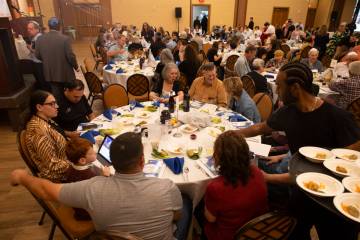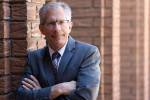Clergy members in Las Vegas Valley feel stress, too; here’s how they cope
Members of the clergy spend hours counseling parishioners, comforting the sick or dying, dealing with administrative headaches as well as coping with the unexpected. Then there’s that sermon to prepare and bills of their own to pay.
Perhaps more than most, ministers, rabbis and other religious leaders understand the role stress plays in our society and the challenges it presents. They feel it, too.
Here’s how some of them cope with the pressures of their work.
“We provide the opportunity for sabbaticals,” says the Rev. Kevin Odor, senior pastor at Canyon Ridge Christian Church. “We hit the ground running when we started Canyon Ridge and knew that we didn’t want to re-create everything, so we looked to see what other churches were doing.”
Pastors of the large church in the northwest valley are encouraged to take three-month sabbaticals once every six years to renew themselves physically, mentally and spiritually.
Odor uses the field of education as an example of the success of the practice.
“It’s like the education world where the value of fresh thinking is important,” he notes. “There’s the professor who hasn’t had a new idea in 20 years. When that professor goes on sabbatical, he might write a book or do research, and he’s sharper when he returns. The students are blessed with fresher ideas and a refreshed professor.
“I have been on three sabbaticals in 23 years. I went on my first one after nine years before taking the next one after six years and my last one after seven years. When I went on my sabbaticals, I didn’t need to go. I wasn’t crashing or burning.”
But Odor, 59, finds the experiences helpful, nonetheless.
“You get a chance to de-throttle and ramp back up,” Odor explains. “It’s preventative maintenance rather than crashing and burning. A sabbatical is even better than a vacation. It’s a purposeful break and not a vacation. There is a laundry list of places to be with intentional refueling and refilling.”
He also takes his own Sabbath, a 24-hour period every week when he relaxes and refrains from work.
“My Sabbath is my replenishment,” Odor adds. “It runs from Sunday night at six until Monday night at six.”
He has three other outlets to recharge: golfing, working out at the gym and reading.
Stress is part of life, but it should not be ignored, Odor says.
“Stress is not bad, but stress without recovery is bad,” he says. “If we don’t recover, that’s when we break. It’s all like a rubber band.”
Rabbi Felipe Goodman of Temple Beth Sholom says compassionate fatigue can be a big problem for clergy as a result of caring for and helping traumatized or suffering people.
Goodman realizes he will be the most effective in his work if he’s refreshed and renewed, so he takes one vacation every year.
“I try to go to places where I have never been,” said the 49-year-old native of Mexico City. “When you go to a new place you experience new things. I find things that pique my interest and rest me at the same time.”
This past summer, he, his wife and two of the family’s three children took a two-week vacation to Argentina, where they relaxed at Iguazu Falls.
“It’s a long way to go, but it’s all worth it,” Goodman says. “Also, Argentina has a very large Jewish community, so I picked up some new ideas. That’s how I deal with burnout.”
With the demands of serving as a clergyman, Goodman said it can be tough to disengage.
“We are clergy because we are concerned about what’s going on around us. These issues can get into our souls, so we need our space.”
In order to keep himself focused the rest of the year, Goodman has another outlet.
“I learned from someone that it’s very important to do something that has nothing to do with our work, so I started taking kung fu classes about six years ago, and this has really helped me maintain a balance.”
The Church of Jesus Christ of Latter-day Saints approaches leadership as one part of life. For instance, Michael Gardner is a 45-year-old orthodontist, father of five and stake president.
“Running is my outlet,” says Gardner, now in his sixth year serving in the unpaid church leadership position. “I don’t profess to be a marathon runner. I just run an average pace. There’s just something about going outside and hitting the pavement that lets me unwind in a beautiful way.”
With two offices for his dental work, Gardner says he can recognize when it’s time to change directions.
“It’s like riding a bicycle and every bike is different,” Gardner says of the daily challenges. “All of us get burned out and there doesn’t have to be a red light out in front of us. I have had scenarios where it hits you. You learn to recognize the warning signals and when to unwind.”
Bonnie Pauley, who has been the Clark County Detention Center chaplain for 34 years, is also on the staff of Christ Church Episcopal. Although she works 70 hours a week, she says she never feels the need to gear down.
“I just love my work,” Pauley says. “I have a passion for what I do and this job really gives me life. Because of that, I really stay focused. I do face stressful situations, but never to the point that they affect me negatively.”
Going to the gym is one outlet she enjoys. “Then, too, I love to clean because it’s my own level of therapy. I don’t play golf and I don’t play bridge, so I enjoy pulling weeds and playing in the dirt. I also meditate, although I’m not a serious meditator.”
Dan Newburn of Sun City Community Church has a simple solution to avoiding burnout.
“I reduce the stress of being a pastor by remembering these things: God is God and I am not. God is God and other people are not. God loves me this I know for the Bible tells me so. I am to love other people the same way God loves me. I find most of the stress in my life of 78 years is removed when I remember these things.”



































